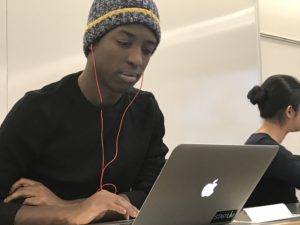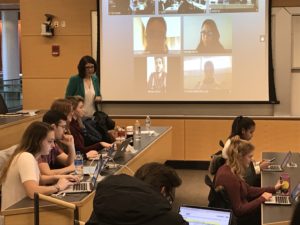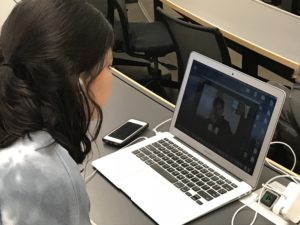Dozens of students from U-M’s three campuses gather at the Ross School of Business, surrounded by monitors upon which teams from across the world can be seen. Everyone waits anxiously for their respective classroom connections to occur.
This is the first meeting of M²GATE, a new virtual exchange program during which the students will work together across cultures to develop business ideas to solve social challenges in the Middle East North Africa (MENA) region.
The MENA-Michigan Initiative for Global Action Through Entrepreneurship (M²GATE) virtual exchange program offers students the chance to collaborate with others from Egypt, Libya, Morocco, and Tunisia. Over an eight-week period, the teams develop a pitch video for the social issue they identified. The team with the best pitch from each of the three cohorts will travel to Ann Arbor and meet each other, participating in joint activities including a pitch competition.

Charles Gay introduces himself to his teammates and they begin brainstorming ideas for their project.
After a brief presentation of course goals by program leaders, the U-M students scatter throughout Ross to have their first conversations via Blue Jeans. Their assignment: to find uncommon commonalities, create a team name, and start discussing a social issue.
The conversations are bit slow to start, hampered somewhat by technical issues, but soon the teams are discussing school and home life, national pastimes, religion and more, and finding both commonalities and differences that could impact how they work together.
“In the U.S. when you reach 18 you leave home, but here you stay with your family until you get married,” a student from Cairo said.
From common interests in barbeque chicken, comedy movies and football (although even there lies a difference between U.S. football and what we would call soccer), to observations of how differently families are structured, the students report out their backgrounds and ask each other questions that help build their team culture.
“Is there more of a religion or culture in your country?” one student from U-M asked. “Here there are so many religions.”
By the halfway mark of the opening session, student teams have progressed far, having identified certain social issues they hope to fix. Even through technical glitches, midterms and holiday plans, they quickly maneuvered around these problems and got to work.
The first group has proposed solutions for unemployment in Morocco; child labor in Egypt; improving education in the region, including a focus on soft skills (communication, social, emotional and people skills); and environmental issues such as pollution due to plastic bags and water use in Morocco.
“It’s been rewarding to see students bridging cultures to identify and tackle weighty societal challenges together,” said Amy Gillett, vice president of the William Davidson Institute’s Education Initiative, which is delivering the program. “I am sure these powerful new connections will lead to lasting friendships — and to positive changes in the MENA region.”

Surry Scheerer (left) and Rima Hassouneh co-teaching “Introduction to Cross Cultural Team Building” at the kick-off module. They ask students to find uncommon commonalities with their teammates.
The U-M students still have plenty of questions about the MENA region, but they have a clearer understanding of it too, speaking to the issues of unemployment, soft skills, education and more.
“I think we need to focus on recent university graduates in Tunisia,” LSA senior Erin Drabicki said to her teammates during their meeting. “We really want them to be able to utilize their education.”
Drabicki’s team is tackling the issue of the high unemployment rates in Tunisia, looking at the possibility of creating a website that facilitates the job search. Her team is also exploring the idea of assisting students with getting internships, so they can enter the job market with more experience.
“The biggest challenge for me so far has been trying to understand and develop a project that relies on knowing the culture and needs present in Tunisia, as someone who lives in the United States,” Drabicki said.
Drabicki joined the program because she thought it would be a great way to mix her interests in business and social change.
“I decided to participate in this virtual exchange program because I loved my experience studying abroad last year, and I want to continue to expand my knowledge through diverse and international learning environments,” Drabicki said.
Drabicki’s teammate, Asma Motmem, who attends the Mediterranean Institute of Technology in Tunisia, enjoys the collaborative approach to the project.
“This is my first experience creating a business like this, and I’m glad we’re all working on it together,” Motmem said.

Students in a Ross classroom connect virtually with others around the world.
For Ross freshman Brett Ritter, this program is the first time he’s being exposed to the challenge of creating a business model based off a problem in real life.
“Learning to work with people from other lifestyles and cultures is difficult but something everyone should learn to appreciate and do,” Ritter said. “We all need to understand the struggles people go through, no matter where in the world they are. I may have never known anything about Morocco otherwise, but unemployment in Morocco is a real problem that I now see and want to help fix.”
Ritter’s team is working to address high unemployment rates, focusing on Morocco as several of his teammates are from the country. In the past, banks offered microloans for Moroccans to start their own business, but many borrowers did not know how to effectively use the money, and ended up losing it. Because of this, banks are not as willing to give microloans to citizens.
His team discussed several options, debating on working with the banks versus creating a seminar system where money management techniques are taught. With the help of their mentor, they decided on the seminar system, realizing it was a business model that could be replicated anywhere, instead of being specific to Morocco. Similar to M²GATE’s format, they could also host a workshop where Moroccans would develop a business model for a specific business idea and finance it accordingly.
Ross freshman Isha Kenkare’s team is focusing on the issue of soft skills, realizing how important they are not just in the professional setting but for all aspects of life.
“After research and personal testimonials from my teammates in Morocco, we found this is an issue that is not being stressed upon (or even taught), and yet is so important in whatever career you go into,” Kenkare said. “However, in the United States, soft skills are weaved into the curriculum. Using the two cultures, we hope to make a change.”

A U-M student talks with global classmates about football and leaving home.
Kenkare’s team created this video to explain their goals.
“Even though I have only known my four Moroccan teammates for a short time and virtually, we have grown to become good friends.”
M²GATE is a program of the Stevens Initiative, which is supported by the State Department and the Bezos Family Foundation. Named for U.S. Ambassador J. Christopher Stevens, the Stevens Initiative is an international effort to build global competence and career readiness for young people in the United States and the Middle East and North Africa while growing and enhancing the field of virtual exchange: online, international, and collaborative learning.
M²GATE is still accepting applications for Cohort 3, running May 25 to July 20.


